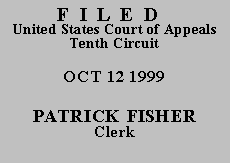

| ROBERT DAVIS, | |
| Petitioner-Appellant, | |
| v. | |
| PATRICIA A. MADRID, Attorney General for the State of New Mexico, | |
| Respondent-Appellee. |
Petitioner Robert Davis, proceeding pro se, seeks a certificate of appealability to appeal the district court's dismissal of his petition for a writ of habeas corpus filed pursuant to 28 U.S.C. § 2254.
In 1981, Petitioner pleaded guilty in New Mexico state court to numerous charges of larceny and armed robbery. He was sentenced to five thirteen-year concurrent sentences. While he did not directly appeal his conviction, Petitioner filed at least two applications for state post-conviction relief in the mid-1980s, both of which were denied. In the habeas corpus petition, Petitioner claimed that he was denied effective assistance of counsel because counsel failed to investigate and challenge the improper search of Petitioner's van. Respondent answered by asserting that the petition was time-barred under 28 U.S.C. § 2244(d) and that Petitioner had procedurally defaulted his claims in state court.
The magistrate judge determined that Petitioner's habeas corpus action was time-barred by the one-year limitations period of the Antiterrorism and Effective Death Penalty Act, 28 U.S.C. § 2244(d), and recommended that the petition be dismissed. After reviewing and rejecting Petitioner's objections, the district court adopted the magistrate judge's findings and recommendation, dismissing with prejudice the § 2254 petition as untimely. It subsequently denied Petitioner's request for a certificate of appealability.
Under the AEDPA, the one-year period of limitations generally begins to run from "the date on which the judgment became final by the conclusion of direct review or the expiration of the time for seeking such review." 28 U.S.C. § 2244(d)(1)(A). For prisoners whose convictions became final prior to April 24, 1996, however, the one-year limitations period does not begin running until April 24, 1996. See Hoggro v. Boone, 150 F.3d 1223, 1225 (10th Cir. 1998); United States v. Simmonds, 111 F.3d 737, 744-46 (10th Cir. 1997). Additionally, under § 2244(d)(2), the one-year period of limitations is tolled during the time post-conviction review is pending in state court. See Hoggro, 150 F.3d at 1226. We also have stated that the one-year limitations period "may be subject to equitable tolling." Miller v. Marr, 141 F.3d 976, 978 (10th Cir.), cert. denied, U.S. , 119 S. Ct. 210 (1998).
Because Petitioner's conviction became final on July 30, 1981, the one-year period of limitations began running on April 24, 1996, and his petition was due on April 23, 1997. His October 19, 1998 filing was untimely unless the period of limitations should be tolled. Neither of Petitioner's two applications for state post-conviction relief tolls the one-year limitations period because both were dismissed by 1992.(1) However, Petitioner essentially asks us to toll the limitations period on the basis of circumstances beyond his control which constitute "excusable neglect and mistake" that should excuse his untimely filing. Application for Cert. of Appealability at 2. He asserts that his transfer out of New Mexico in 1991 prevented him from knowing that his application for collateral review had been dismissed and is sufficient reason for equitably tolling the limitations period. Petitioner also contends "that but for [the] unprofessional errors [made by his counsel,] there is a reasonable probability that the outcome of [his] 1981 criminal proceedings would have been more propitious." Petitioner's Br. at 2.A.
This court previously has indicated that equitable tolling principles apply only where a prisoner has diligently pursued his federal habeas claims. See Miller v. Marr, 141 F.3d at 978; see also Davis v. Johnson, 158 F.3d 806, 811 (5th Cir. 1998) (stating that AEDPA's one-year limitations period will be equitably tolled only "in rare and exceptional circumstances"), cert. denied, U.S. , 119 S. Ct. 1474 (1999); Miller v. New Jersey Dep't of Corrections, 145 F.3d 616, 618-19 (3d Cir. 1998) (noting that equitable tolling applies only where prisoner has diligently pursued claims but has in some "extraordinary way" been prevented from asserting his rights). Having reviewed the record, Petitioner's application and brief, and the applicable law, we conclude that his claims of excusable neglect and mistake are not sufficient to demonstrate that Petitioner diligently pursued his federal habeas claims. The record does not support Petitioner's assertion that he attempted to learn the status of his state collateral proceeding, nor does his transfer out of New Mexico explain or justify the long delay from either January 17, 1992 (the date the New Mexico state court dismissed Petitioner's second post-conviction application), or April 23, 1997 (the date on which the federal habeas petition was due), to October 19, 1998 (the filing date). See Miller v. Marr, 141 F.3d at 978. Further, while Petitioner alleges that his attorney's mistakes cost him a more favorable result, he has not asserted a substantiated claim of actual innocence. See id. Under these circumstances, we refuse to apply equitable tolling principles and conclude that the federal habeas corpus petition was untimely.
Because Petitioner has not "made a substantial showing of the denial of a constitutional right," 28 U.S.C. § 2253(c)(2), his request for a certificate of appealability is DENIED and the appeal is DISMISSED.
Entered for the Court
Monroe G. McKay
Circuit Judge
*. This order and judgment is not binding precedent, except under the doctrines of law of the case, res judicata, and collateral estoppel. The court generally disfavors the citation of orders and judgments; nevertheless, an order and judgment may be cited under the terms and conditions of 10th Cir. R. 36.3.
1.Apparently, Petitioner filed a petition for writ of habeas corpus in the New Mexico Supreme Court on August 18, 1998. Because this application was filed after April 23, 1997, it has no bearing on the timeliness of this petition.